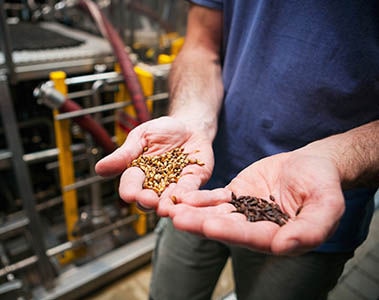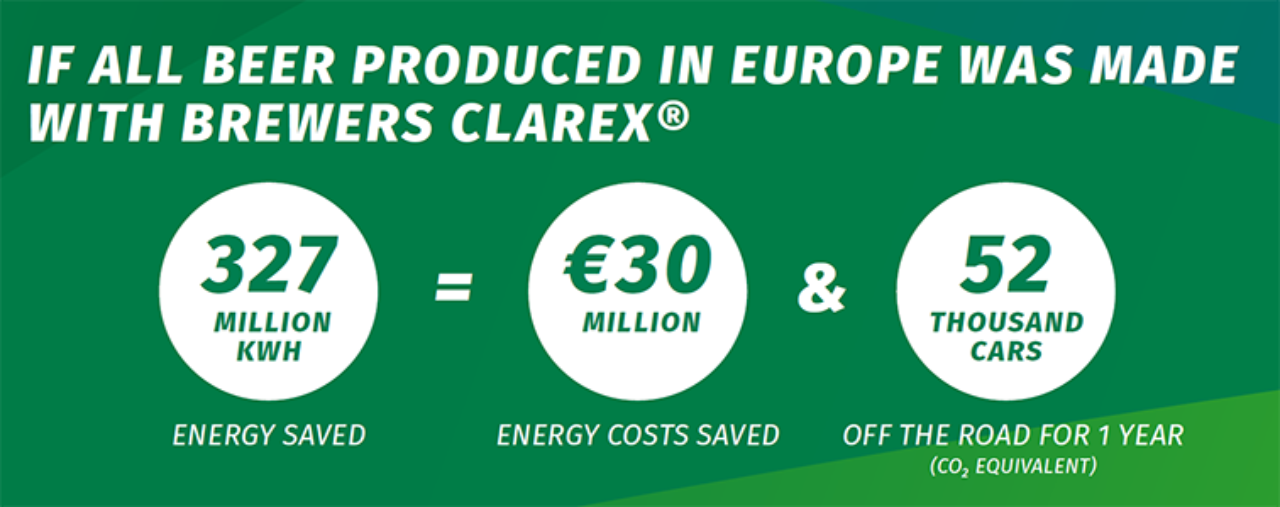
News
mayo 5, 2022
Elaboración de un vaso de cerveza más sostenible, con ayuda de soluciones enzimáticas

It’s no longer enough to talk about sustainability; the time has come to put words into action. In the brewing industry, some of the largest companies in the business are putting a firm stake in the ground and committing to ambitious planet targets. How achievable are they?
Driving change in any industry requires a critical mass of good intention and meaningful action. As climate change comes to the forefront of the public agenda, it’s clear that market success and long-term viability for any business will depend on building more sustainable operations. That’s because today’s conscious consumers are mindful of the environmental impact of the products they purchase, and the power they have to create a greener future through their choices.
It’s no longer enough to talk about sustainability; the time has come to put words into action. In the brewing industry, some of the largest companies in the business are putting a firm stake in the ground and committing to ambitious planet targets. How achievable are they?
Driving change in any industry requires a critical mass of good intention and meaningful action. As climate change comes to the forefront of the public agenda, it’s clear that market success and long-term viability for any business will depend on building more sustainable operations. That’s because today’s conscious consumers are mindful of the environmental impact of the products they purchase, and the power they have to create a greener future through their choices.
Brewing Industry sets bold targets as course for action
The brewing industry is taking note, and leading players are making clear commitments to embrace sustainability throughout their operations. Just recently, Diageo launched a 10-year sustainability action plan with ambitious targets that align to the United Nations Sustainable Development Goals (SDGs). Among their plan’s three focus areas is ‘pioneering grain-to-glass sustainability’, and the company is setting goals to achieve net zero carbon emissions from direct operations and to use 30% less water in every drink it produces by 20301. Carlsberg have also set ambitious science-based targets to reach ZERO emissions from their breweries by 2030, read in detail about their sustainability roadmap here.
ABInBev has similarly aligned to the SDGs and committed to its own 2025 Sustainability Goals that include getting 100% of purchased electricity from renewable sources2.
HEINEKEN announced its 2030 Brew a Better World programme, a set of ambitious commitments aimed at driving a positive impact on the environment, social sustainability and the responsible consumption of alcohol, as part of their efforts towards net zero carbon by 2030.

Innovative enzyme solutions put sustainability targets in reach
“The momentum within the brewing industry toward sustainable operations, and the commitment from many global breweries to take real action to get there, is both compelling and really exciting for all of us,” says Joana Carneiro, Business Director Beverages, dsm-firmenich Food Specialties.
“As a partner to breweries around the world, dsm-firmenich is responding in kind with a broadening portfolio of brewing enzymes that will help brewers produce a more sustainable glass of beer that tastes great and begs another sip.”
As an example, dsm-firmenich recently added Maxadjunct™ ß L, a high-performance adjunct brewing enzyme, to its enzyme portfolio. The choice of raw material can have a significant impact on overall efficiency, energy usage and cost. Thus, brewers invested in more sustainable production can increase the use of adjuncts, such as rice, maize and cassava, to help reduce the amount of malt in their recipes. The malting process for barley is quite energy- and water-intensive, so using less of it and increasing the ratio of adjuncts can have a big impact on reducing CO2 emissions.
Maxadjunct™ ß L gives brewers the flexibility to use a wide variety of raw materials (even up to 100% adjuncts) and deliver the same great-tasting beer. An added benefit is that adjuncts are often sourced locally, which further contributes to a circular economy in the region and a lower carbon footprint.

Results that make a difference
Enzymes are naturally sustainable, simple to use and can be added to different stages of brewers’ existing production processes, depending on the application and intended effect. Right now our Brewer’s Clarex® has been in the market for more than 10 years and is a proven technology with an average of 1 per 4 bottles in beer production being brewed with it to support a variety of sustainability targets globally . It’s a unique liquid enzyme added to the fermentation stage that streamlines beer stabilization by eliminating the deep cooling and rinsing step.

This reduced maturation time (by one day) can enable brewers to cut their carbon footprint by 5-6%, reduce water use by 1% and reach energy cost savings up to €70,000 per 1 million hectoliters of beer produced. In fact, if all the beer in Europe was made with Brewers Clarex®, the energy saved (327 KWH) would equal €30 million in cost savings and 52,000 fewer cars on the road for one year!
Brewers Clarex® and the rest of dsm-firmenich's portfolio of robust brewing enzymes is complemented by a highly skilled team of application experts, with years of experience helping breweries deliver sustainable, on-trend beverages to consumers.

It’s clear that sustainability is no longer a trend but a requirement – for doing business, for staying in business and for countering the impact of climate change. When businesses large and small get on board and make tangible commitments to ensure a greener future, as has happened in brewing, it creates opportunities for innovative solutions, like dsm-firmenich's portfolio of brewing enzymes, that will help enable this future.
Ya no basta con hablar de sostenibilidad; ha llegado el momento de pasar de las palabras a los hechos. En la industria cervecera, algunas de las mayores empresas del sector están apostando fuerte y comprometiéndose con ambiciosos objetivos medioambientales. ¿Qué tan factibles es esto?
Impulsar el cambio en cualquier sector requiere una gran cantidad de buenas intenciones y acciones concretas. A medida que el cambio climático se sitúa en el primer plano de la agenda pública, está claro que el éxito del mercado y la rentabilidad a largo plazo de toda empresa dependerán de la creación de operaciones más sostenibles. Esto se debe a que los consumidores conscientes de hoy en día se preocupan por el impacto medioambiental de los productos que compran y por el poder que tienen para crear un futuro más ecológico a través de sus preferencias.
El sector cervecero se fija objetivos ambiciosos en su rumbo a seguir
El sector cervecero está tomando nota, y los principales actores se están claramente comprometidos a adoptar la sostenibilidad en todas sus operaciones. Recientemente, Diageo ha puesto en marcha un plan de acción de sostenibilidad a 10 años con objetivos ambiciosos que responden a los Objetivos de Desarrollo Sostenible (ODS) de las Naciones Unidas. Entre las tres áreas prioritarias de su plan se encuentra la de "ser pioneros en la sostenibilidad del grano al embotellado", y la empresa se ha fijado el objetivo de conseguir cero emisiones netas de carbono en sus operaciones directas y de utilizar un 30 % menos de agua en cada bebida que produzca de aquí a 20301. Carlsberg también ha fijado ambiciosos objetivos basados en la ciencia para que sus fábricas de cerveza alcancen cero emisiones para el año 2030, lea en detalle su hoja de ruta de sostenibilidad aquí.
ABInBev también se ha alineado con los ODS y se ha comprometido con sus propios objetivos de sostenibilidad para 2025, que incluyen obtener el 100 % de la electricidad que se compra de fuentes renovables2.
HEINEKEN ha anunciado su programa 2030 Brew a Better World, un conjunto de ambiciosos compromisos destinados a impulsar un impacto positivo en el medio ambiente, la sostenibilidad social y el consumo responsable de alcohol, como parte de sus esfuerzos por alcanzar el objetivo de cero emisiones netas de carbono para 2030.

Las soluciones enzimáticas innovadoras ponen los objetivos de sostenibilidad dentro de la realidad
"El empuje de la industria cervecera a favor de las operaciones sostenibles, y el compromiso de muchas cervecerías mundiales de tomar medidas reales para alcanzarlas, es convincente y realmente emocionante para todos nosotros", afirma Joana Carneiro, Directora de Negocio de Bebidas de DSM Food Specialties.
"Como socio de cervecerías de todo el mundo, DSM está respondiendo de la misma manera con una cartera cada vez más amplia de enzimas para elaboración de cerveza que ayudarán a los fabricantes a producir un vaso de cerveza más sostenible que sabe muy bien y merece otro sorbo."
Como ejemplo, DSM recientemente incorporó a su cartera la Maxadjunct™ ß L, una enzima cervecera adjunta de alto rendimiento. La elección de la materia prima puede tener un impacto significativo en la eficiencia general, el uso de la energía y el costo. Por lo tanto, los cerveceros que invierten en una producción más sostenible pueden aumentar el uso de adjuntos, como el arroz, el maíz y mandioca, para ayudar a reducir la cantidad de malta en sus recetas. El proceso de malteado de la cebada requiere bastante energía y agua, por lo que utilizar menos y aumentar la proporción de adjuntos puede tener un gran impacto en la reducción de las emisiones de CO2.
Maxadjunct™ ß L ofrece a las cerveceras la flexibilidad de utilizar una amplia variedad de materias primas (incluso hasta el 100 % de adjuntos) y ofrecer la misma cerveza con un gran sabor. Una ventaja adicional es que los adjuntos suelen ser de origen local, lo que contribuye a una economía circular en la región y a una menor huella de carbono.

Resultados que marcan la diferencia
Las enzimas son naturalmente sostenibles, sencillas de utilizar y pueden incorporarse a las distintas fases de los procesos de producción de las cerveceras, en función de la aplicación y el efecto deseado. Actualmente, nuestra Brewers Clarex® lleva más de 10 años en el mercado y es una tecnología probada, que en promedio, 1 de cada 4 botellas en la producción de cerveza que se elabora con él apoya diferentes objetivos de sostenibilidad a nivel mundial. Se trata de una enzima líquida exclusiva que se añade a la fase de fermentación y que agiliza la estabilización de la cerveza ya que elimina el paso de enfriamiento y aclarado profundo.

Esta reducción del tiempo de maduración (de un día) puede permitir a las cerveceras reducir su huella de carbono en un 5 a 6 %, reducir el uso de agua en 1 % y alcanzar un ahorro de gastos de energía de hasta €70,000 por cada millón de hectolitros de cerveza producida. De hecho, si toda la cerveza de Europa se elaborara con Brewers Clarex®, la energía ahorrada (327 KWH) representaría un ahorro de ¡€30 millones y 52,000 autos menos en circulación durante un año!
Brewers Clarex® y el resto de la robusta cartera de enzimas para elaboración de cerveza de DSM se complementan con un equipo altamente capacitado de expertos en aplicaciones, con años de experiencia ayudando a las cervecerías a ofrecer bebidas sostenibles y de actualidad a los consumidores.
Es evidente que la sostenibilidad ha dejado de ser una tendencia para convertirse en una exigencia: para operar, para seguir activos y para contrarrestar el impacto del cambio climático. Cuando las empresas, grandes y pequeñas, asumen compromisos tangibles para garantizar un futuro más ecológico, como ha sucedido en la industria cervecera, surgen oportunidades para soluciones innovadoras, como la cartera de enzimas para elaboración de cerveza de DSM, que ayudarán a hacer posible este futuro.

Brew more beer with locally sourced raw materials

Brewers Compass® enables brewers to replace malt with locally available raw materials, such as barley or blends of wheat, maize, rice, sorghum and cassava. The barley malting process accounts for approximately 10 to15% of the eco-footprint of beer. Switching from malt to barley brewing allows a 10% reduction in barley consumption and cuts water and energy use. When brewing with 100% barley, using Brewers Compass®, the carbon footprint savings are typically over 60 kilograms of CO₂ per ton of barley used.
Elabore más cerveza con materias primas locales
Brewers Compass® permite a los productores de cerveza a reemplazar la malta con materias primas locales, tal como cebada o mezclas de trigo, maíz, arroz, sorgo y mandioca. El proceso de malteado de cebada es responsable aproximadamente del 10 al 15 % de la huella ecológica de la cerveza. Cambiar la fermentación de malta a cebada permite una reducción del 10 % en el consumo de cebada y reduce el uso de agua y energía. Al preparar con 100 % cebada usando Brewers Compass®, el ahorro de huella de carbono suele ser superior a 60 kg de CO₂ por tonelada de cebada utilizada.


Reducción de energía en la producción de cerveza
La solución única de DSM para la estabilización de cerveza, Brewers Clarex®, reduce el tiempo de maduración de la cerveza. Añadido durante la etapa de fermentación, Brewers Clarex® les permite a los productores de cerveza saltarse el paso de enfriamiento profundo y enjuague en el proceso de estabilización y clarificación, ayudando a ahorrar energía y agua. Simplemente cambiar a Brewers Clarex® puede ayudar a reducir la huella de carbono de compañías productoras de cerveza hasta un 5 a 6 %, reducir el uso de agua por 1 % y generar ahorros de costo de energía hasta €70,000 por cada 1 millón de hectolitros de cerveza producidos.
Artículos relacionados
Energy savings in beer production

dsm-firmenich's unique solution for beer stabilization, Brewers Clarex®, reduces the maturation time of beer. Added during the fermentation stage of brewing, Brewers Clarex® allows brewers to skip the deep cooling and rinsing step in the beer stabilization and clarification process, helping to save energy and water. Simply switching to Brewers Clarex® can reduce the carbon footprint of brewing companies by 5 to 6%, reduce water usage by 1% and tally energy cost savings up to €70,000 per 1 million hectoliters of beer produced.
References
- BeverageDaily.com, November 23, 2020
- Ab-Inbev.com
- BeverageDaily.com, September 2, 2020
Latest news
-

-

13 August 2022
Path to Premium for Beer
-
